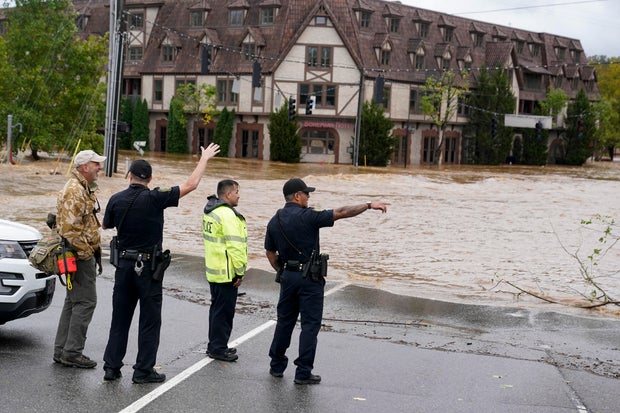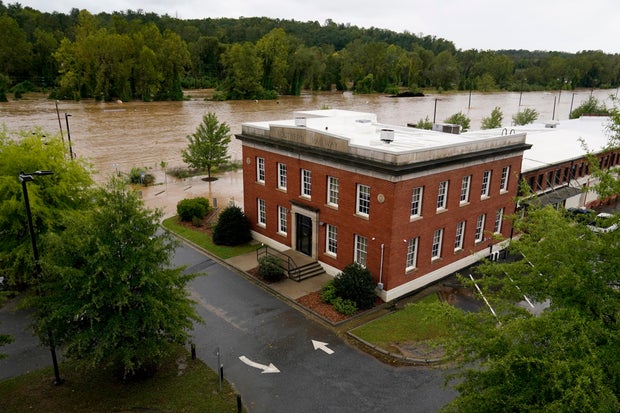CBS News
North Carolina’s Asheville devastated after Helene’s damage cuts power, floods roads

Floodwaters pushed by the remnants of Hurricane Helene left North Carolina’s largest mountain city largely cut off Saturday by damaged roads and a lack of power and cellphone service, part of a swath of destruction across southern Appalachia that left an unknown number dead and countless worried relatives unable to reach loved ones.
In North Carolina alone, more than 400 roads remained closed on Saturday as floodwaters began to recede and reveal the extent of damage. North Carolina Gov. Roy Cooper said that supplies were being airlifted to that part of the state. Cooper said two people died in his state, Helene killed at least 52 people across multiple states.
Among those rescued from rising waters was nurse Janetta Barfield, whose car was swamped on Friday morning as she left an overnight shift at Asheville’s Mission Hospital. She said she watched a car in front of her drive through standing water and thought it was safe to proceed. But her car stalled, and within minutes water had filled her front seat up to her chest. A nearby police officer who saw her car stall helped her to safety.
“It was unbelievable how fast that creek got just in like five minutes,” Barfield said.
Erik Verduzco / AP
Early on Saturday morning, many gas stations were closed because they didn’t have electricity, and the few that were open had hourlong lines wrapped around the block. The hub of tourism and arts, home to about 94,000 people, was unusually still after floodwaters swamped neighborhoods known for drawing visitors including Biltmore Village and the River Arts District, which is home to numerous galleries, shops and breweries.
More than 700,000 power customers were without power across North Carolina, including 160,000 in Buncombe County. Interstate 40 and I-26 were impassible in multiple locations, and a state transportation department map showed that most routes into Asheville and across much of the mountains were snarled. North Carolina’s Department of Transportation posted on social media on Saturday afternoon that “all roads in Western North Carolina should be considered closed.”
In Asheville, there was no cellular service and no timeline for when it would be restored.
“We have had some loss of life,” County Emergency Services Director Van Taylor Jones told reporters. However, he said they were not ready to report any specifics. Officials have been hindered in contacting next of kin by the communications outages. Asheville police instituted a curfew from 7:30 p.m. Friday to 7:30 a.m. Saturday.
“The curfew is to ensure the public’s safety and will be in effect until further notice,” police said.
Asheville transit services were also suspended, police said. The city advised residents to boil “all water used for human consumption,” as there was at least one significant water line break during the storm. Many residents might not be getting water or reduced or no pressure water.
Jones said the area experienced a cascade of emergencies that included heavy rain, high winds and mudslides. Officials said they tried to prepare for the storm but its magnitude was beyond what they could have imagined.
“It’s not that we (were) not prepared, but this is going to another level,” Sheriff Quentin Miller said. “To say this caught us off-guard would be an understatement.”
Erik Verduzco / AP
Atlanta resident Francine Cavanaugh said she has been unable to reach her sister, son, or friends in the Asheville area.
“My sister checked in with me yesterday morning to find out how I was in Atlanta,” she said on Saturday. “The storm was just hitting her in Asheville, and she said it sounded really scary outside.”
Cavanaugh said her sister had no idea how bad the storm would be there. She told Cavanaugh she was going to head out to check on guests at a vacation cabin “and that’s the last I heard of her. I’ve been texting everyone that I know with no response. All phone calls go directly to voicemail.”
CBS News
11/16: Saturday Morning – CBS News

Watch CBS News
Be the first to know
Get browser notifications for breaking news, live events, and exclusive reporting.
CBS News
McDonald’s investing $100 million to lure customers back to the fast food giant after E. coli outbreak

McDonald’s is investing $100 million to bring customers back to stores after an outbreak of E. coli food poisoning tied to onions on the fast-food giant’s Quarter Pounder hamburgers.
The investments include $65 million that will go directly to the hardest-hit franchises, the company said.
The U.S. Centers for Disease Control and Prevention has said that slivered onions on the Quarter Pounders were the likely source of the E. coli. Taylor Farms in California recalled onions potentially linked to the outbreak.
The E. coli outbreak has sickened 104 people in 14 states, federal health officials said in an update on Wednesday.
At least 34 people have been hospitalized, and four developed hemolytic uremic syndrome (HUS), a serious condition that can cause kidney failure. An 88-year-old man who resided in Grand Junction, Colorado, died, as previously reported. The illnesses began at the end of September, and the most recent onset of illness occurred as of Oct. 21, according to the U.S. Food and Drug Administration.
The Food and Drug Administration has said that “there does not appear to be a continued food safety concern related to this outbreak at McDonald’s restaurants.”
However, the outbreak hurt the company’s sales.
Quarter Pounders were removed from menus in several states in the early days of the outbreak.
In a statement Wednesday obtained by CBS News, McDonald’s said it had found an “alternate supplier” for the approximately 900 restaurants that had temporarily stopped serving Quarter Pounders with slivered onions.
“Over the past week, these restaurants resumed the sale of Quarter Pounder burgers with slivered onions,” McDonald’s said.
CBS News reached out to McDonald’s on Saturday for a statement regarding the reported investment.
CBS News
U.S. health officials report 1st case of new form of mpox in a traveler

Health officials said Saturday they have confirmed the first U.S. case of a new form of mpox that was first seen in eastern Congo.
The person had traveled to eastern Africa and was treated in Northern California upon return, according to the California Department of Public Health. Symptoms are improving and the risk to the public is low.
Mpox is a rare disease caused by infection with a virus that’s in the same family as the one that causes smallpox. It is endemic in parts of Africa, where people have been infected through bites from rodents or small animals.
Earlier this year, scientists reported the emergence of a new form of mpox in Africa that was spread through close contact including through sex.
More than 3,100 confirmed cases have been reported just since late September, according to the World Health Organization. The vast majority of them have been in three African countries – Burundi, Uganda, and the Democratic Republic of the Congo.
Since then, cases of travelers with the new mpox form have been reported in Germany, India, Kenya, Sweden, Thailand, Zimbabwe, and the United Kingdom.
Health officials earlier this month said the situation in Congo appears to be stabilizing. The Africa Centers for Disease Control and Prevention has estimated Congo needs at least 3 million mpox vaccines to stop the spread, and another 7 million vaccines for the rest of Africa.
The current outbreak is different from the 2022 global outbreak of mpox where gay and bisexual men made up the vast majority of cases.











